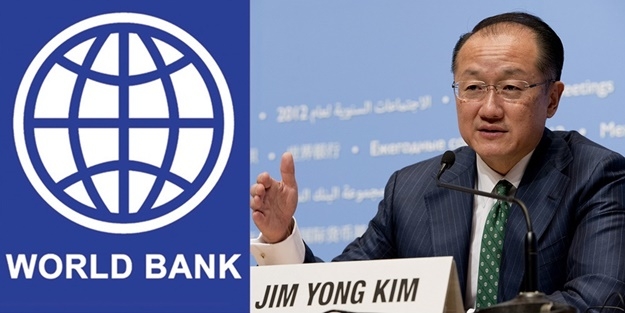WORLD BANK's GLOBAL ECONOMIC PROSPECTS REPORT
World Bank lowered its global economic growth forecast to 3.3 percent in Global Economic Prospects (GEP) report, from 3.5 in the June report.
After growing by an estimated 2.6 percent in 2014, the global economy is projected to expand by 3 percent this year, 3.3 percent in 2016 and 3.2 percent in 2017, predicts the Bank’s twice-yearly flagship. Developing countries grew by 4.4 percent in 2014 and are expected to edge up to 4.8 percent in 2015, strengthening to 5.3 and 5.4 percent in 2016 and 2017, respectively.
Following another disappointing year in 2014, developing countries should see an uptick in growth this year, boosted in part by soft oil prices, a stronger U.S. economy, continued low global interest rates, and receding domestic headwinds in several large emerging markets, said the World Bank GEP report.
"DEVELOPING COUNTRIES NEED TO UNDERTAKE STRUCTURAL REFORMS"
"In this uncertain economic environment, developing countries need to judiciously deploy their resources to support social programs with a laser-like focus on the poor and undertake structural reforms that invest in people" said World Bank Group President Jim Yong Kim. "It’s also critical for countries to remove any unnecessary roadblocks for private sector investment. The private sector is by far the greatest source of jobs and that can lift hundreds of millions of people out of poverty."
"THE LOWER OIL PRICE IS LOWERING INFLATION WORLDWIDE"
"Worryingly, the stalled recovery in some high-income economies and even some middle-income countries may be a symptom of deeper structural malaise" said Kaushik Basu, World Bank Chief Economist and Senior Vice President. "As population growth has slowed in many countries, the pool of younger workers is smaller, putting strains on productivity. But there are some silver linings behind the clouds. The lower oil price, which is expected to persist through 2015, is lowering inflation worldwide and is likely to delay interest rate hikes in rich countries."
"LOW OIL PRICES PRESENT AN OPPORTUNITY TO UNDERTAKE REFORMS"
Commodity prices were projected to stay soft in 2015, as had been discussed in a chapter in the report, the unusually steep decline in oil prices in the second half of 2014 could significantly reduce inflationary pressures and improve current account and fiscal balances in oil-importing developing countries, said in the statement on the report.
"Lower oil prices will lead to sizeable real income shifts from oil-exporting to oil-importing developing countries. For both exporters and importers, low oil prices present an opportunity to undertake reforms that can increase fiscal resources and help broader environmental objectives" said Ayhan Kose, Director of Development Prospects at the World Bank.
"THE FALL IN OIL PRICES WOULD HELP LOWER INFLATION"
Amongst large middle-income countries that will benefit from lower oil prices is India, where growth was expected to accelerate to 6.4 percent this year, from 5.6 percent in 2014, rising to 7 percent in 2016-17. In Brazil, Indonesia, South Africa and Turkey, the fall in oil prices would help lower inflation and reduce current account deficits, a major source of vulnerability for many of these countries.
"Risks to the global economy are considerable. Countries with relatively more credible policy frameworks and reform-oriented governments will be in a better position to navigate the challenges of 2015" concluded Franziska Ohnsorge, Lead Author of the report.
DHA


 DAYAKÇI İMAM SERBEST BIRAKILDI
DAYAKÇI İMAM SERBEST BIRAKILDI LİSEDE İĞRENÇ OLAY
LİSEDE İĞRENÇ OLAY BURSALI, ERDOĞAN'dan ÖZÜR DİLEDİ
BURSALI, ERDOĞAN'dan ÖZÜR DİLEDİ MECLİS'te İSRAİL GERİLİMİ
MECLİS'te İSRAİL GERİLİMİ SEKTÖR YAPI FUARINDA BULUŞUYOR
SEKTÖR YAPI FUARINDA BULUŞUYOR TBMM'de YENİ DÖNEM
TBMM'de YENİ DÖNEM "ASKERİ TESİSLERİ HEDEF ALACAĞIZ"
"ASKERİ TESİSLERİ HEDEF ALACAĞIZ" "ENFLASYONU DÜŞÜRECEĞİZ"
"ENFLASYONU DÜŞÜRECEĞİZ" "DAHA GÜÇLÜ YANIT VERİRİZ"
"DAHA GÜÇLÜ YANIT VERİRİZ" KRİZ YARATACAK İDDİA
KRİZ YARATACAK İDDİA IMF'den TÜRKİYE AÇIKLAMASI
IMF'den TÜRKİYE AÇIKLAMASI İSRAİL KARŞILIK VERME KARARI ALDI
İSRAİL KARŞILIK VERME KARARI ALDI İRAN'a DÜNYADAN TEPKİ YAĞIYOR
İRAN'a DÜNYADAN TEPKİ YAĞIYOR GÖÇ YASASI KABUL EDİLDİ
GÖÇ YASASI KABUL EDİLDİ ABD'den DİKKAT ÇEKEN AÇIKLAMA
ABD'den DİKKAT ÇEKEN AÇIKLAMA İSRAİL TÜRKİYE'yi ŞİKAYET ETTİ
İSRAİL TÜRKİYE'yi ŞİKAYET ETTİ BELÇİKA'da PKK PROVOKASYONU
BELÇİKA'da PKK PROVOKASYONU GAZZE'de ATEŞKES
GAZZE'de ATEŞKES MB FAİZİ YÜZDE 50'YE YÜKSELTTİ
MB FAİZİ YÜZDE 50'YE YÜKSELTTİ 200 TL'nin SATIN ALMA GÜCÜ ERİDİ
200 TL'nin SATIN ALMA GÜCÜ ERİDİ KREDİ KATLARINA DÜZENLEME
KREDİ KATLARINA DÜZENLEME TÜRKİYE NÜFUSU BELLİ OLDU
TÜRKİYE NÜFUSU BELLİ OLDU "EMEKLİ MAAŞ FARKI ÖDEMELERİ BAŞLADI"
"EMEKLİ MAAŞ FARKI ÖDEMELERİ BAŞLADI" YOKSULLUK SINIRI 49 bin TL'yi AŞTI
YOKSULLUK SINIRI 49 bin TL'yi AŞTI SSK ve BAĞ-KUR EMEKLİLERİNE EK ZAM
SSK ve BAĞ-KUR EMEKLİLERİNE EK ZAM EMEKLİYE EK ZAM TEKLİFİ MECLİS'e GELİYOR
EMEKLİYE EK ZAM TEKLİFİ MECLİS'e GELİYOR KİRA DESTEKLERİNDE ARTIŞ
KİRA DESTEKLERİNDE ARTIŞ INDUSTRIAL INVESTMENTS CONTINUE to STAGNATE
INDUSTRIAL INVESTMENTS CONTINUE to STAGNATE THE WORLD's “POOREST” PRESIDENT MUJICA in ISTANBUL
THE WORLD's “POOREST” PRESIDENT MUJICA in ISTANBUL AS WOMEN, WE REFUSE TO BE SILENT!
AS WOMEN, WE REFUSE TO BE SILENT! TURKEY's UNEMPLOYMENT RATE ROSE to 9,8%...
TURKEY's UNEMPLOYMENT RATE ROSE to 9,8%... TURKISH OFFICIAL 'BARKS' AFTER TWEET by 'FAKE GÖKÇEK'
TURKISH OFFICIAL 'BARKS' AFTER TWEET by 'FAKE GÖKÇEK' U.S. AMBASSADOR JOHN BASS HAS HELD a VISIT to HÜRRİYET
U.S. AMBASSADOR JOHN BASS HAS HELD a VISIT to HÜRRİYET HDP COMMITTEE MEETS PKK FIGURES in KANDİL
HDP COMMITTEE MEETS PKK FIGURES in KANDİL TURKEY's UNEMPLOYMENT RATE RISES...
TURKEY's UNEMPLOYMENT RATE RISES... MOVIE to be SHOT in 'DRACULA's CASTLE' in TURKEY
MOVIE to be SHOT in 'DRACULA's CASTLE' in TURKEY KADINLARIN GİZEMLİ DUYGULARI TUALE YANSIDI
KADINLARIN GİZEMLİ DUYGULARI TUALE YANSIDI VAN’da TİYATRO ŞENLİĞİ
VAN’da TİYATRO ŞENLİĞİ NAYİNO
NAYİNO ALBARAKA TÜRK'ten ÖZEL PROJE
ALBARAKA TÜRK'ten ÖZEL PROJE İZMİR'de ÖDÜLLÜ GECE
İZMİR'de ÖDÜLLÜ GECE GÖKTÜRK CAZ FESTİVALİ BAŞLIYOR
GÖKTÜRK CAZ FESTİVALİ BAŞLIYOR İZMİR FİLM FESTİVALİ BAŞLIYOR
İZMİR FİLM FESTİVALİ BAŞLIYOR BİR YILDIZ DOĞUYOR
BİR YILDIZ DOĞUYOR YAZDI, OYNADI, YÖNETTİ
YAZDI, OYNADI, YÖNETTİ ORİON DÜNYA’ya DÖNDÜ
ORİON DÜNYA’ya DÖNDÜ UZAY EĞİTİMLERİ BAŞLADI
UZAY EĞİTİMLERİ BAŞLADI HAVACILAR İSTANBUL’da BULUŞTU
HAVACILAR İSTANBUL’da BULUŞTU BURASI KANDİL DEĞİL, FRANSA...
BURASI KANDİL DEĞİL, FRANSA... OYUN ENDÜSTRİSİ PAZARI BÜYÜYOR
OYUN ENDÜSTRİSİ PAZARI BÜYÜYOR YERLİ 'SWİTCH' GELİYOR
YERLİ 'SWİTCH' GELİYOR İKLİM DEĞİŞİKLİĞİ ARILARI OLUMSUZ ETKİLİYOR
İKLİM DEĞİŞİKLİĞİ ARILARI OLUMSUZ ETKİLİYOR AKADEMİSYENLER BİR ARADA
AKADEMİSYENLER BİR ARADA SEYİR HALİNDEYKEN UYUDU
SEYİR HALİNDEYKEN UYUDU ACİL SERVİS BOŞALTILDI
ACİL SERVİS BOŞALTILDI DSÖ'den YENİ SALGIN UYARISI
DSÖ'den YENİ SALGIN UYARISI PROTEZ SONRASI BİSİKLET KULLANABİLİRSİNİZ
PROTEZ SONRASI BİSİKLET KULLANABİLİRSİNİZ ÇAY TİRYAKİLERİ AMAN DİKKAT
ÇAY TİRYAKİLERİ AMAN DİKKAT GENÇLERDE DE ARTIŞ GÖSTERİYOR
GENÇLERDE DE ARTIŞ GÖSTERİYOR KÜRESEL ÇAPTA HIZLA YAYILIYOR
KÜRESEL ÇAPTA HIZLA YAYILIYOR "TEŞHİS SÜRECİ YILLAR ALABİLİYOR"
"TEŞHİS SÜRECİ YILLAR ALABİLİYOR" DEMİR SOPALARLA SALDIRDILAR
DEMİR SOPALARLA SALDIRDILAR TAHLİYE İLE ORTAYA ÇIKAN SKANDAL
TAHLİYE İLE ORTAYA ÇIKAN SKANDAL PERU YANGIN YERİ
PERU YANGIN YERİ BİR 25 KASIM DAHA GEÇTİ...
BİR 25 KASIM DAHA GEÇTİ... ÖNCE ÖLDÜRDÜ, SONRA DA ÇÖPE ATTI
ÖNCE ÖLDÜRDÜ, SONRA DA ÇÖPE ATTI BU KEZ DE ESKİ SEVGİLİ DEHŞETİ
BU KEZ DE ESKİ SEVGİLİ DEHŞETİ CİLDİNİZİ YAZA HAZIRLAYIN
CİLDİNİZİ YAZA HAZIRLAYIN "GÖBEKLİTEPE'de KADIN İZLERİ"
"GÖBEKLİTEPE'de KADIN İZLERİ"  KADIN CİNAYETLERİ DURMUYOR
KADIN CİNAYETLERİ DURMUYOR KADINLAR BAKIRKÖY’de BULUŞTU
KADINLAR BAKIRKÖY’de BULUŞTU KAN DONDURAN DETAY
KAN DONDURAN DETAY F.BAHÇE AVRUPA'da ÇEYREK FİNALDE
F.BAHÇE AVRUPA'da ÇEYREK FİNALDE RİYAD'da BİR TEPKİ DE İTALYA'dan
RİYAD'da BİR TEPKİ DE İTALYA'dan ECZACIBAŞI 3. KEZ DÜNYA ŞAMPİYONU
ECZACIBAŞI 3. KEZ DÜNYA ŞAMPİYONU FİLENİN SULTANLARI FİNALDE
FİLENİN SULTANLARI FİNALDE PELE, SON YOLCULUĞUNA UĞURLANDI
PELE, SON YOLCULUĞUNA UĞURLANDI CHRİSTOPH DAUM KANSERE YAKALANDI
CHRİSTOPH DAUM KANSERE YAKALANDI FİLENİN SULTANLARI TAM GAZ
FİLENİN SULTANLARI TAM GAZ 3. KEZ DÜNYA ŞAMPİYONU OLDU
3. KEZ DÜNYA ŞAMPİYONU OLDU ALİ KOÇ ATEŞ PÜSKÜRDÜ...
ALİ KOÇ ATEŞ PÜSKÜRDÜ... İSTANBUL'da KANLI İNFAZ
İSTANBUL'da KANLI İNFAZ CANAVAR TEYZE İÇİN KARAR
CANAVAR TEYZE İÇİN KARAR YÜZÜNCÜYIL GAZETECİLER DERNEĞİ KURULDU
YÜZÜNCÜYIL GAZETECİLER DERNEĞİ KURULDU KATİL ZANLISI TEK TEK ANLATTI
KATİL ZANLISI TEK TEK ANLATTI SAHİL DEĞİL SANKİ CESET TARLASI
SAHİL DEĞİL SANKİ CESET TARLASI GÖKÇE'nin ÖLÜM NEDENİ KALP KRİZİ
GÖKÇE'nin ÖLÜM NEDENİ KALP KRİZİ MİNİK LEYLA CİNAYETİNDE YENİ GELİŞME
MİNİK LEYLA CİNAYETİNDE YENİ GELİŞME BUNUN ADI BARBARLIK
BUNUN ADI BARBARLIK İZMİR’de SİLAHLI ÇATIŞMA
İZMİR’de SİLAHLI ÇATIŞMA MUSTAFA DESTİCİ ÖZÜR DİLEDİ
MUSTAFA DESTİCİ ÖZÜR DİLEDİ KESİNTİNİN NEDENİ AÇIKLANDI
KESİNTİNİN NEDENİ AÇIKLANDI WHATSAPP, FACEBOOK ve INSTAGRAM ÇÖKTÜ
WHATSAPP, FACEBOOK ve INSTAGRAM ÇÖKTÜ "İLKELİ" DOĞAN MEDYA İRFAN DEĞİRMENCİ'Yİ KOVDU
"İLKELİ" DOĞAN MEDYA İRFAN DEĞİRMENCİ'Yİ KOVDU CAN ATAKLI RADYOCU da OLUYOR
CAN ATAKLI RADYOCU da OLUYOR İŞTE ULUSAL KANAL'ın YENİ GENEL YAYIN YÖNETMENİ
İŞTE ULUSAL KANAL'ın YENİ GENEL YAYIN YÖNETMENİ NAZLI ILICAK O KANALDAN KOVULDU
NAZLI ILICAK O KANALDAN KOVULDU DHA'nın AYLAN KURDİ FOTOĞRAFI TIME’ın "YILIN 100 FOTOĞRAFI-2015" ARASINDA
DHA'nın AYLAN KURDİ FOTOĞRAFI TIME’ın "YILIN 100 FOTOĞRAFI-2015" ARASINDA DOĞAN MEDYA'DA DEPREM
DOĞAN MEDYA'DA DEPREM VOLKAN KONAK'tan JET YANIT
VOLKAN KONAK'tan JET YANIT AYLA ALGAN SON VEDA
AYLA ALGAN SON VEDA VOLKAN KONAK'a SUÇ DUYURUSU
VOLKAN KONAK'a SUÇ DUYURUSU ÜNLÜ AKTÖR TRT DİZİSİNDEN AYRILDI
ÜNLÜ AKTÖR TRT DİZİSİNDEN AYRILDI MAHKEMEDEN SEREN SERENGİL KARARI
MAHKEMEDEN SEREN SERENGİL KARARI HADİSE ŞİKAYET ETTİ...
HADİSE ŞİKAYET ETTİ... ÜNLÜ MODACI TASARIMLARIYLA BÜYÜLÜYOR
ÜNLÜ MODACI TASARIMLARIYLA BÜYÜLÜYOR YARGI HAREKETE GEÇTİ
YARGI HAREKETE GEÇTİ  HAYRANINA NAKLEN ARABESK SÜRPRİZİ
HAYRANINA NAKLEN ARABESK SÜRPRİZİ NACİ GÖRÜR AÇIKLADI
NACİ GÖRÜR AÇIKLADI SAKİNE CANSIZ CİNAYETİNİN AYRINTILARI
SAKİNE CANSIZ CİNAYETİNİN AYRINTILARI GAZZE
GAZZE KIRIM NEDEN ÖNEMLİ
KIRIM NEDEN ÖNEMLİ































